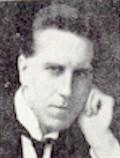- |
User Links
Thomas F. Dunhill › Hymnals

www.hymntime.com/tch
| Short Name: | Thomas F. Dunhill |
| Full Name: | Dunhill, Thomas F. (Thomas Frederick) 1877-1946 |
| Birth Year: | 1877 |
| Death Year: | 1946 |
Born: February 1, 1877, Hampstead, London, England.
Died: March 13, 1946, Scunthorpe, Lincolnshire, England.
Buried: Appleby, Lincolnshire, England.
Dunhill was a gifted piano student, and a childhood enthusiast for the light operas of Gilbert & Sullivan, whose work he emulated by composing a number of small operettas in his teens. In 1893, he enrolled at the Royal College of Music, London, studying pianoforte under Franklin Taylor and composition under Charles Stanford. His contemporaries included Ralph Vaughan Williams, Gustav Holst, and John Ireland, who remained a lifelong friend. He won an open scholarship for composition in 1897.
Dunhill was a music-master at Eton College for several years before becoming a professor at the Royal College of Music in 1905. From 1907-19 he gave concerts of chamber music in London. He himself wrote chamber music and also songs and song-cycles. His song-cycle The Wind Among the Reeds, for tenor voice and orchestra, was first performed by Gervase Elwes with the Royal Philharmonic Orchestra at Queen’s Hall in 1912. His setting of William Butler Yeats’ "The Cloths of Heaven" is well known. Elwes (with Frederick B. Kiddle) recorded his song "A Sea Dirge," a setting of Shakespeare’s lyric "Full fathom five."
In July 1918, Dunhill chaired the meeting of Directors of the Royal Philharmonic Society which set out to reclaim democratic control of the Society’s affairs when, during World War I, they had largely fallen under the single, if highly benevolent, control of Thomas Beecham and his secretary Donald Baylis.
Dunhill gave a concert of music by British composers in Belgrade in 1922, which included his own Symphony in A minor composed during the war, and in 1924 contributed Serbian articles to the Dent Musical Dictionary/.
After the war, Dunhill’s work shifted from orchestral and chamber music toward light opera and other genres. In 1931, his light opera Tantivy Towers was a considerable success in London, and a suite of ballet movements, Gallimaufry, was performed in Hamburg in 1937.
During the 1920s and 1930s, he wrote very many small pieces for piano, for musicians to play at home, many of which were published. Some of his elementary pieces are still used by the Associated Board (ABRSM) for examinations. Dunhill had from 1906 been a senior examiner for the ABRSM, taking him overseas on several occasions.
Dunhill led a busy life as an administrator, in addition to his work as a composer, teacher and examiner. He adjudicated at several regional music festivals, lectured and occasionally broadcast on the BBC. In the early 1940s he composed a number of suites for wind instruments, which continue to be popular.
In 1914, Dunhill married Molly Arnold, a great-grand-daughter of Thomas Arnold of Rugby. She died of tuberculosis in 1929. They had three children. (One of his sons, David Dunhill, 1917-2005, was a BBC radio announcer for many years.) In 1942, he married Isobel Featonby; they both became music teachers at Eton College during World War II.
Dunhill’s works include:
Chamber Music: A Treatise for Students (London: Macmillan, 1913)
"Edward German, An Appreciation"(Musical Times, Vol. 77, No. 1126 (December 1936), pp. 1073–77)
Sullivan’s Comic Operas—A Critical Appreciation (London: Edward Arnold, 1928)
Sir Edward Elgar (London: Blackie & Son, 1938)
© The Cyber Hymnal™ (www.hymntime.com/tch)


 My Starred Hymns
My Starred Hymns


